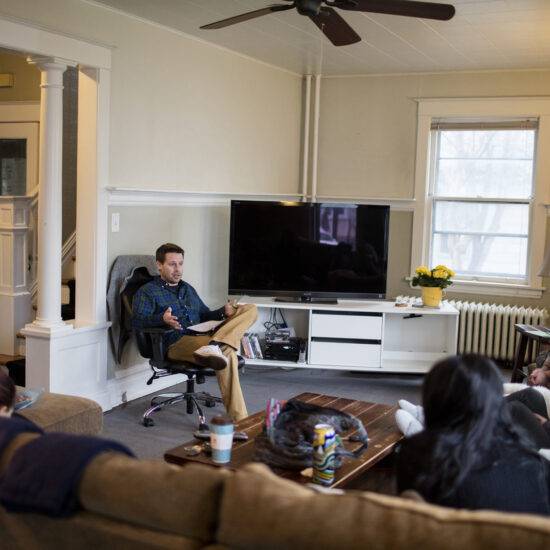Recovery houses also referred to as sober living homes, are residential facilities that provide a safe and supportive environment for individuals in early recovery from addiction. They bridge the gap between formal treatment programs and independent living. Imagine them as a stepping stone on the path to long-term sobriety.
What is the Goal of Sober Living?
The primary goal of sober living is to empower individuals in early recovery to build a strong foundation for long-term sobriety. This is achieved by providing a supportive and structured environment that bridges the gap between formal addiction treatment and independent living. Below is a detailed analysis of the primary objectives:
Reduced Relapse Risk
Sober living houses minimize relapse risks by offering a safe, drug- and alcohol-free environment. Strict house rules, accountability measures, and the absence of triggers create a supportive space that fosters healthy habits and discourages substance use.
Developing Life Skills
Many programs within sober living residences equip residents with essential life skills for independent living. These skills are crucial for success beyond the recovery house. Budgeting, job search assistance, communication skills, and relapse prevention strategies are common examples. Learning these skills fosters self-sufficiency and reduces the risk of returning to old, unhealthy patterns.
Building a Support Network
Recovery is a challenging journey, and a strong support system is vital for long-term success. Sober living fosters a sense of community and belonging. Residents connect with others who understand the struggles of addiction, offering encouragement, celebrating milestones, and providing a safe space to share experiences. This built-in network helps individuals stay motivated and committed to their recovery goals.
Continued Professional Support
While not all sober living facilities offer this, many have established relationships with addiction specialists, therapists, and case managers. This continued professional guidance helps residents address underlying issues that may have contributed to their addiction. Therapists can also assist in developing healthy coping mechanisms and navigating the challenges of recovery.
Transitioning to Independent Living
Ultimately, the goal of sober living is to prepare individuals for successful independent living. By fostering a sense of responsibility, healthy habits, and life skills, sober living houses empower residents to reintegrate into society with confidence and a lower risk of relapse.
What Are The Benefits Of Recovery Houses?
The journey to recovery from addiction is a marathon, not a sprint. While completing a treatment program is a crucial first step, the transition back to everyday life can be challenging. This is where recovery houses come in, offering a supportive and structured environment for individuals to solidify their foundation in sobriety.
A Bridge Between Treatment and Independence
Recovery houses, also known as sober living homes, bridge the gap between formal addiction treatment and independent living. Following a structured program, these residences provide a safe and supportive space for individuals to continue their recovery journey. Residents can focus on building life skills, developing healthy coping mechanisms, and practicing relapse prevention strategies, all within a sober and accountable environment.
Benefits of Recovery Houses

Recovery houses offer a multitude of advantages for those seeking long-term sobriety. Listed below are a number of the primary benefits:
Reduced Risk of Relapse
Recovery houses provide a crucial buffer zone between the structured environment of treatment and the potential triggers of everyday life. Residents are surrounded by others who understand the challenges of addiction, creating a support system that minimizes the temptation to relapse. Strict house rules, often including curfews and random drug testing, further reduce the risk of relapse.
Structured Environment and Support
Recovery houses offer a structured environment that helps individuals maintain a routine and avoid the idleness that can lead to cravings. Residents typically participate in chores, attend house meetings, and may even have curfews. This structure provides a sense of stability and accountability, promoting a focus on recovery goals.
Development of Life Skills
Recovery houses offer programs and workshops that equip residents with essential life skills. These skills may include budgeting, job search assistance, communication skills development, and relapse prevention strategies. Learning these skills empowers individuals to confidently navigate daily life and reduces the risk of returning to old, unhealthy patterns.
Building a Support Network
Recovery is a journey best not taken alone. Recovery houses foster a sense of camaraderie and belonging among residents. Sharing experiences, offering encouragement, and celebrating milestones create a powerful support network that strengthens individual resolve.
Continued Professional Support
Many recovery houses have relationships with addiction specialists, therapists, and case managers who provide ongoing professional support to residents. This continued professional guidance helps individuals address underlying issues, develop coping mechanisms, and navigate the challenges of recovery.
Sense of Community
Recovery houses foster a sense of community and belonging. Residents are surrounded by others who understand the struggles of addiction, creating a safe space to share experiences, offer support, and celebrate successes. This sense of community combats feelings of isolation and encourages individuals to remain committed to their recovery goals.
What is the typical duration of stay for individuals in sober living arrangements?
There’s no set timeframe for how long someone stays in a sober living home. The ideal duration depends on individual needs and progress in recovery. However, some general guidelines exist:
Minimum Recommendation
Many recovery professionals recommend a minimum of 90 days (3 months) in a sober living house after completing addiction treatment. This allows individuals to solidify the foundations of sobriety in a supportive environment before facing the challenges of independent living.
Average Stays
Studies suggest average stays in sober living homes can range between 166 and 254 days (roughly 5-8 months). This timeframe provides a more substantial period to develop coping mechanisms, life skills, and relapse prevention strategies.
Ultimately Individualized
The most important factor is individual progress. Some people may be ready to transition to independent living after 3 months, while others may benefit from a longer stay (up to a year or more) to fully address underlying issues and build a strong foundation for sobriety.
Severity of Addiction
Individuals with a more severe addiction history or complex mental health conditions may require a longer stay to achieve stability and develop effective coping mechanisms.
Progress in Recovery
The rate at which someone progresses in recovery programs and demonstrates a commitment to sobriety can influence their stay’s duration.
Individual Needs
Factors like a person’s support network outside the recovery house, job opportunities, and living situation after discharge can also play a role in determining the ideal length of stay.
Finding the Right Duration
Discussions with addiction psychiatrists, therapists, and the recovery house itself are crucial for determining the optimal length of stay. Regularly evaluating progress and individual needs helps ensure a smooth transition back to independent living with a strong foundation for long-term sobriety.
Assessing Whether a Sober Living Home is Suitable for Your Needs
Recovery houses aren’t a one-size-fits-all solution. Individuals considering entering a recovery house should assess their needs and preferences. Some factors to consider include the house’s rules and regulations, the level of structure provided, and the availability of additional programs or services.
Finding the Right Recovery House
There are numerous recovery houses available, with varying program offerings and philosophies. Addiction treatment facilities, mental health experts, and local support organizations are important assets in locating a sober living home that suits your specific requirements.
FAQs
What is the objective of the recovery program?
The journey of recovery involves a transformative process wherein individuals enhance their well-being, lead lives guided by their own choices, and endeavor to achieve their utmost capabilities. With assistance, even individuals grappling with severe and enduring substance use disorders can overcome their challenges and reclaim both their health and social integration.
What are the different types of recovery?
There exist two forms of recovery: active and passive. Each holds significance, with individuals potentially adopting either approach according to their current situation. This article delves into the advantages of active recovery and elucidates its distinctions from passive recovery.
Why is self-care important in recovery?
Self-care plays a pivotal role in fostering recovery as it aids individuals in cultivating a constructive self-image while navigating the trials of addiction. Additionally, it empowers them to perceive a greater degree of autonomy over their decisions, thereby enhancing their resilience.
Don’t wait to take control of your future…..
Recovery from addiction is a commendable pursuit, and a recovery house can be a transformative stepping stone on your journey. This supportive environment offers the structure, guidance, and sense of community you need to solidify your foundation in sobriety and develop the skills necessary for long-term success. Recovery is a lifelong journey, and a recovery house can be a powerful tool to solidify your foundation in sobriety. By providing a supportive environment, structure, and access to ongoing support, recovery houses empower individuals to build a healthy and fulfilling life beyond addiction. Reach out to Bhouses , we understand your struggles!










